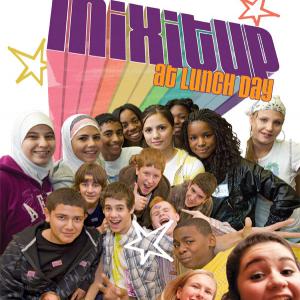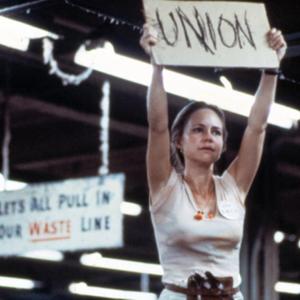
Rachel Marie Stone is a writer, editor, and speaker living near Philadelphia. Her first book, Eat With Joy: Redeeming God's Gift of Food won the 2014 Christianity Today Book Award for Christian living and was named one of the ten most intriguing books of the year by Religion News Service. She is also the author of The Unexpected Way, a book about Jesus for children, and contributes regularly to Books and Culture, Christianity Today, her.meneutics, The Englewood Review of Books, Washington Post's "Acts of Faith" blog, and other publications.
Posts By This Author
I Support Mix It Up At Lunch Day BECAUSE I am a Christian
One of my current writing projects has me spending a lot of time in the Gospels, especially the Gospel according to Luke, which may be my favorite Gospel (are we allowed to have favorites?) not least because of its astonishing reversals:
It's the Gospel where a poor, uneducated girl — Mary — has more faith than an educated, aged, male priest--Zechariah.
It's the Gospel where a widow's two pennies amounts to more in God's eyes than fat donations from wealthy pockets.
It's the Gospel where Jesus says: “When you give a banquet, invite the poor, the crippled, the lame, the blind." Invite the people who can't pay you back, because that is the where the real reward is.
Yes, Luke's Gospel is a Gospel that proclaims love for the marginalized. And out of the four, Luke has the most meals.
(It's the Gospel in which Jesus is accused, among other things, of being a "glutton and a drunkard," who eats with "tax collectors and 'sinners.'")
In other words, it's the Gospel that Mixes It Up At Lunch.
It's Empowered Birth Awareness Week
Every so often I hear the insinuation that women (like me) who advocate for "normal" childbirth are inordinately self-focused (even selfish) and that women who are dissatisfied with the treatment they’ve received in hospitals during labor are “uncheerful” and, possibly — according to the women in controversial pastor Douglas Wilson’s life — confused theologically.
Don’t get me wrong: Ricki Lake’s memoir, at least as it concerns childbirth, definitely looks at the birth experience as if it is all about her. But while there’s no question that medical advances (and, yes, c-sections!) save lives, it’s also hard to contest the fact that medical interventions occur at rates that are simply unjustified.
September 3 (Labor Day) launched “Empowered Birth Awareness Week,” which, sponsored by ImprovingBirth.org, aims to raise people’s consciousness concerning the notion of “evidence-based maternity care,” the less than radical notion that what happens during birth (ie, continuous fetal monitoring, mandatory IVs, NPO rules that prohibit eating and drinking) should be medically indicated, not routine, and supported by sound medical research.
A Labor Day Reading, Listening, Watching List
I make no secret of the fact that there is a big soft spot in my heart for the tremendous gains of the labor movement in American history and a big sad spot for how certain unions — such as those representing meatpackers and agricultural workers — have been all but decimated.
So in no particular order, here are some of my favorite pro-labor, pro-union resources for really celebrating Labor Day.
It's Hard for a Rich People to Enter God's Kingdom
I've been having little arguments with myself all week: on one hand, like many good Americans, I believe in the idea and potential and creativity and wonder of individuals. I believe that the mind, for example, is a fathomless miracle. I believe that individuals have certain rights to freedom and self-determination.
Yet at the same time, everything that we are has been given us. We carry in our bodies the genes of thousands if not millions of ancestors; we have been brought to this moment — every moment — by people whose care and attention and patience have loved us imperfectly along. And, of course, by the God who has loved us into being.
Those of us who have the gift of being able to read and write often also have the ability to learn and to choose — to choose where to live and with whom, to choose what to think and to believe and to consume. And that, compared to how most people have lived and do live, is an almost unimaginable luxury. We can choose.
I'm With Mrs. Gates: Contraception Shouldn't Be Controversial
I have to admire Melinda Gates' chutzpah.
In her recent TED talk and on her blog, Impatient Optimist, Gates insists that "contraception is not controversial" — when, in the last year, it has been explosively controversial, with many Christians (not just Catholic Christians) seeing the "contraceptive mandate" as a real threat to religious freedom.
Yesterday, the new Affordable Care Act laws took effect, meaning that most employers must now provide free birth control coverage in their health insurance policies. Whether it constitutes a threat to religious liberty and whether remains to be seen — faith-based groups with religious objections to the law have a "safe harbor" until Aug. 1, 2013. Whether HHS will create an extension of this harbor is as yet unknown.
Regular readers of my blog know where I stand on health insurance. As to the contraceptive mandate specifically, I'd prefer not to wade in those particular waters — David Gibson had a good piece if you're interested in the question of whether the mandate kills religious freedom. However, I do want to consider two small points about contraception that lean me toward the (self-identified Catholic!) Melinda Gates point of view:
1. Contraception doesn't take life;
2. Women want contraception.
Is Hating My Body a Sin?
To begin, we might ask “What’s sin?” I’m aware that there are about a thousand disputed ways to answer that question–and so no one ‘perfect’ way–but I like this one:
Sin is the seeking of our own will instead of the will of God, thus distorting our relationship with God, with other people, and with all creation.
And I’d add that the people who make it easy for all of us to hate our bodies (through relentless idealization of unreal bodies, through profit-motivated manufactured discontent) are more ‘guilty’ than the teenager who thinks there’s something wrong with her thighs.
Then we might ask “what’s meant by ‘hating my body’?” There’s no answer in a catechism, of course, but we could try something like this:
Hating one’s body is the disrespecting of the body God has given us, which in itself is worthy of respect and honor, being made in God’s image, the fulfilling of desires in ways God not intend, to believe lies about human bodies in general and ours in particular, and to covet for ourselves a body not our own.
One Deadly Infection, Two Healthy Babies, and Three Broken Legs (or, how Government Healthcare Totally Saved My Behind)
Brace yourselves. I’m about to step on a soapbox.*
Much as I’d like to go all armchair-Constitutional-scholar and argue that access to affordable health care SHOULD be in the same category as education, fire-fighting, and law enforcement, I’m not going to.
I’m just going to tell you what has happened in MY family.
February, 2005, California
Pregnant with first child. Am on crappy private insurance that costs like $500 a month in premiums but covers almost nothing. Calculate that cost of having child will be approximately half our yearly income.
Freak out.
Why It Matters Whether a Toy is Thin and Sexy (Or Not)
So the ‘thinner-and-sexier evolution” series is kind of winding down, as there are (thankfully, I think?) only a limited number of consumer products that have been around long enough so as to be able to undergo some kind of thin-and-sexy transformation. Besides, at this point, it’s kind of "clicked there, browsed that," you know? Especially since every toy/image transformation does some basic variation on the theme of “thin down and sex up.”
Call it the Barbiefication of toys for girls.
Or, you could call it what the American Psychological Association does, which is sexualization. Sexualization, as opposed to healthy sexuality, is defined (by the APA) as any one of the following:
- a person’s value comes only from his or her sexual appeal or behavior, to the exclusion of other characteristics;
- a person is held to a standard that equates physical attractiveness (narrowly defined) with being sexy;
- a person is sexually objectified — that is, made into a thing for others’ sexual use, rather than seen as a person with the capacity for independent action and decision making; and/or
- sexuality is inappropriately imposed upon a person.
When a Mother Bleeds to Death, a Nation Bleeds
Stories like this one remind me that listening to women’s voices can be a matter of life and death, and not in the whole “Adam-listened-to-Eve” type of way.
Impassioned women of all ages are petitioning Uganda’s highest court to declare that “when women die in childbirth it is a violation of their rights.” So far, their bids in the lower courts have been unsuccessful, but they’re pressing on.
$60 million.
That’s what it would take to hire enough medical workers to meet Uganda’s needs—specifically, to staff village health clinics that lack people and supplies to the degree that an estimated 16 pregnant women die needlessly each day.
Maternal Mortality, Birth Control, and What God Desires
I find myself thinking a lot about maternal mortality (and the issues that surround it, like access to contraception) lately, partly because I’ll soon be moving to a country with one of the world’s most dismal maternal mortality rates, and partly because my husband and I aren’t planning to have more biological children, which means that we’re contracepting for the duration.
Also, Nicholas Kristof and Sheryl WuDunn’s Half the Sky movement is gaining even more visibility — PBS’s Independent Lens is creating a series of short films and some longer features on issues raised in their bestselling, well-worth-reading book even as birth control reemerges again and again as a point of contention between Catholic bishops and nuns, between government policy and religious conviction, and even, as Amy Frykholm as suggested, among evangelicals.
Recently I’ve become aware that unwanted pregnancies are nothing new — certainly not the product of a culture that’s “anti-life” or anti-children, as the new-ish evangelical suspicion of birth control has it. In the 1850s, Mathilde Shillock, a German immigrant settled on the Minnesota frontier wrote,
“God has entrusted us with a son...it seems that his father is happy over it, I myself do not wish for any more children, as I look upon life as a heavy burden. [...] pity is all I can offer [this child]. Pity and a feeling of duty towards him to lighten his blameless fate.”
The 'Field of Panties': Sexual Violence and Immigrant Farmworkers
They call it the field de calzon — the "field of panties" —because so many rapes happen there.
On Wednesday, the organization Human Rights Watch released the report Cultivating Fear: The Vulnerability of Immigrant Farmworkers in the US to Sexual Violence and Sexual Harassment. It’s filled with tales that would make Jeremiah, or Amos, or Micah weep: stories of some of the most marginalized, exploited, and impoverished people in the country.
HRW talked to 160 farmworkers, growers, law enforcement officials, attorneys and other experts in agricultural workplace issues in 8 different states, finding that most women working in agriculture have been — or know someone who has been — victimized sexually at work; confirming the findings of a 2010 survey of California Central Valley workers in which 80 percent reported having experienced sexual harassment or abuse on the job.
It’s common enough that some women farm workers see it as “an unavoidable condition of agricultural work.”
The American Way of Eating--Everyone Wants to Eat Well
I love great food. Last night, I made fresh linguini with organic whole wheat flour and local, free-range eggs, and topped them with from-scratch meatballs made with organic beef, fresh parsley from my garden, fresh Parmesan--you get the idea. And in a few days, I’ll be celebrating a special occasion at one of the finest restaurants in the Northeast, where the produce is local and seasonal and sustainable and where the experience of eating is a little like visiting a museum of fine arts where you get to taste all the masterpieces. And yesterday, I planted the first spring vegetables in my garden. I’m a member of Slow Food USA, for cryin’ out loud.
I’m just waiting for the James Beard foundation to give me a badge for being such a morally superior eater.
Except I’m not. Because while the way I eat is motivated by certain ethical considerations (including but not limited to concern for the health of the environment and that of animals), I’m aware that my way of eating is an almost miraculous privilege. I can eat this way because I happen to live in a place where I can buy eggs from a neighbor and grow vegetables in my backyard. I don’t have much money, but I have the luxury of time to grow my own vegetables, to cook from scratch, and enough wiggle room in the budget to buy 25 pounds of organic flour in bulk (which makes it cheaper) without running out of money before the end of the month.
In a stunning new book, The American Way of Eating,Tracie McMillan goes undercover in farm fields, in the Wal-Mart produce department, and at Applebee’s to explore common assumptions that food-movement types make about the way many Americans eat: that many of us are overweight and unhealthy because we just don’t “care” enough about the quality of our food--with people who are poor “caring” the least. Throughout the book, which chronicles her numerous conversations with low-wage co-workers, McMillan fiercely defends her conviction that everyone--everyone--wants to eat well.










